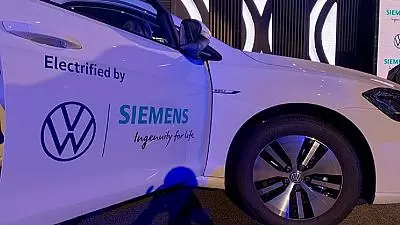

Last updated on September 11th, 2021 at 03:18 pm
Volkswagen is importing a batch of electric powered Golf models into Rwanda for a local ride-hailing service, establishing a bridgehead in the country that it hopes to expand to other nations as it seeks to increase market share globally.
Importing the vehicles into Rwanda, which sells itself to foreign investors on its reliable infrastructure, stability and relative ease of doing business, and where VW already assembles cars, is initially intended to test infrastructure and performance in the region’s climate.
“We’ve been investing more than $30 billion into new electric vehicles and platforms and the entire world is moving in that direction,” VW’s Africa boss Thomas Schaefer told Reuters. “The plan for Africa is that ultimately, we replace the whole fleet into electric.”
“ The Rwandan government is working on electric vehicle policy and if that policy favours electric cars over traditional, then that development can happen very fast. ”
VW, which has a global target of producing 600,000 electric cars a year by 2022, is starting small in Kigali, importing 50 eGolf models in the first few months. The vehicles – combustion-engine cars modified to run on electricity – will be integrated into the company’s app-driven “Move” service, launched last December.
German power equipment firm Siemens will build 15 charging stations in Kigali.
The stations can charge up to 80 percent of a car’s battery within an hour, although it takes around 11 hours to charge a car at home, said Andile Dlamini, the group’s communications officer.
The eGolf’s range, fully charged, is up to 230 kilometers. VW’s new ID3 models to be launched next year will have a range of 600 km.
Rwanda has an installed power generation capacity of 286 MW the cars would mainly charge at night, when there is an excess of power. Unlike many African nations, Rwandan electricity is relatively reliable.
Rwanda’s prime minister Edouard Ngirente said he hoped electric car use could expand, noting fuel products were Rwanda’s biggest import last year.
Schaefer acknowledged the high price of electric cars would not appeal to most African consumers, but said scaling up production and favourable government policy could help bring prices down.
“The Rwandan government is working on electric vehicle policy and if that policy favours electric cars over traditional, then that development can happen very fast,” Schaefer said.
REUTERS
The U.S.-based driver training company Zutobi analyzed road safety worldwide and found South Africa stays last in driving danger since…
The Basketball Africa League (BAL) returns for its 2025 season with exciting changes and developments. Since 2019 the NBA-linked basketball…
The Somali president supports their military forces to eliminate the threats from Al-Shabaab, ISIS, and Al-Qaeda. The Somali National Army…
UAE President Sheikh Mohamed bin Zayed Al Nahyan held talks with President Faustin Archange Touadéra of the Central African Republic…
African football teams struggle intensely in the World Cup Qualification rounds to earn their place on the international football stage.…
The journey toward the 2026 FIFA World Cup is rapidly intensifying for all African teams, who now hold a historical…
This website uses cookies.